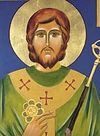

| Previous day | Next day |
| Old Style
March 17
|
Saturday |
New Style
March 30
|
|
3rd Week of Great Lent. Third Saturday of Great Lent. Commemoration of the Dead.
Tone 2.
Great Lent. |
Wine and oil allowed.
|
![]() St. Alexis the Man of God, in Rome (411).
St. Alexis the Man of God, in Rome (411). ![]() St. Macarius, founder of Kalyazin Monastery (Tver) (1483).
St. Macarius, founder of Kalyazin Monastery (Tver) (1483).
Martyr Marinus the Soldier, at Caesarea in Palestine (260). St. Parthenius of the Kiev Caves (1855).
New Hieromartyr Victor Kiranov, archpriest, of Berdyansk (Crimea) (1942).
St. Ambrose, deacon, of Alexandria (400). St. Patrick, bishop of Armagh and enlightener of Ireland (451). St. Gertrude, abbess, of Nivelles (659). St. Beccan of Rhum (677). St. Withburga, solitary at Holkham and East Dereham (ca. 743). Monk-martyr Paul of Crete (767). Hieromartyr Gabriel the Lesser, of Gareji, Georgia (1802). St. Gurias, archbishop of Tauria and Simferopol (1882). St. Theosterictus the Confessor, abbot of Pelecete Monastery near Prusa (826).
Repose of Archbishop Tikhon (Troitsky) of San Francisco (1963).
Thoughts for Each Day of the Year
According to the Daily Church Readings from the Word of God
By St. Theophan the Recluse

Saturday. [Heb. 10:32–38; Mark 2:14–17]
I came not to call the righteous, but sinners to repentance (Mark 2:17). Through the mouth of Wisdom the Lord called the foolish to Himself. He Himself wandered upon the earth, calling sinners. Neither the proud, “clever ones,” nor the self-willed and righteous have a place with Him. Let intellectual and moral weakness rejoice! Mental and active power, step aside! Total weakness that acknowledges itself as such and hastens with faith to the Lord Who healeth the weak and filleth the impoverished, will become strong both intellectually and morally, but will continue to acknowledge both its intellectual poverty and evil inclinations. The power of God, under this unprepossessing cover and made perfect in weakness, invisibly creates a different person who is bright mentally and morally. This brightness is often manifest here, but it is always manifest there, in heaven. Behold what is hidden from the wise and prudent and is revealed only to babes (cf. Matt. 11:25)!
Articles
 Martyr MarinusAfter cruel tortures, the saint was beheaded. |







